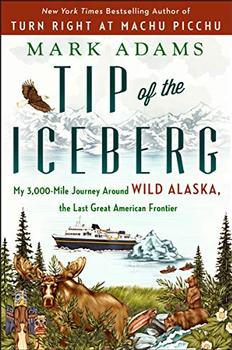Summary | Excerpt | Reviews | Beyond the Book | Readalikes | Genres & Themes | Author Bio

My 3,000-Mile Journey Around Wild Alaska, the Last Great American Frontier
by Mark AdamsCHAPTER TWO
All Points North
NEW YORK CITY
Next to the cluttered desk in my office, I keep a small collection of manila folders labeled with the names of destinations I would like to write about one day. Inside each folder are scraps of paper—bar napkins covered in semi-legible hieroglyphics and yellowed newspaper clippings pertaining to a particular place. In the folder marked ALASKA there's a piece of hotel stationery on which I scribbled something an Alaskan friend once told me. Three basic types of people live in Alaska, he said. There are the Native Alaskans, who've been there since time immemorial. There are people who have come north running toward something, usually a chance to do something unpleasant to make a lot of money quickly, such as gutting fish twelve hours a day or operating a welding torch in minus-forty-degree temperatures. And there are those who are running away from something, like a bad marriage or fluoridated water.
Travel writing is an odd and pleasant way to make a living, one that has enabled me to fast-forward to the sort of life people profiled in Forbes often anticipate once they've made a Harriman-worthy fortune. I wander the world meeting interesting people; I write books; and when not on the road, I spend so much time around the house that my children sometimes feel obligated to tell friends that I really do have a job. Over the years, I have learned that the most interesting questions to answer about a place are rarely the most obvious ones: where to go, when to do so, what to eat, who to go with, or even how to get there. The essential question about travel is: Why? Perhaps you've dreamed of Kenya ever since seeing Out of Africa as a child, or want to meet your distant relatives in Ireland, or long to see a lemur in the wild. A journey away from something—work, stress, societal norms that frown on drinking before 10:00 AM—is a vacation. A journey toward something—a trip with an objective—is an expedition. There are a handful of spectacular places I've put off visiting (and writing about) for years because I never found a good enough reason to go. Until recently, Alaska was one of them.
As it happens, one of the qualifications of my unusual job is knowing a thing or two about the history of exploration. An entire bookcase in my office is crammed with accounts of journeys to the far corners of the earth. The existence of the Harriman Expedition was news to me, though, a gap in my knowledge that grew into embarrassment once I got a look at the league of extraordinary gentlemen Hart Merriam assembled in 1899. His selections had participated in almost every important American expedition since the Civil War.
It seemed I finally had my reason to visit Alaska—my answer to the question "Why?" I could follow in the Harriman Expedition's wake and compare what Hart Merriam's all-star team of experts had recorded with what was happening now. How to do so was another matter. Alaska is essentially a small continent: big enough to hold Texas, California, and Montana (the second-, third-, and fourth-largest states) and still have room left over for New England, Hawaii, and a couple of metropolises. It contains seven mountain ranges and ten peaks taller than any in the Lower 48. Its waterfront accounts for half of all the coast in the United States. Louisiana has four times as many miles of paved roads. Except for a few of the larger cities and towns, most places in Alaska—and almost every place visited by the Harriman Expedition—can be reached only by boat or airplane. You can't even drive to Juneau, the state capital.
I'd never before traveled any serious distance by water, and the idea seemed appealing, a throwback to a time of steamer trunks and straw boaters, a golden age before TSA pat-downs and punitive baggage fees. If I'd been in the market for an Alaska vacation, an Inside Passage cruise would've worked fine. But as was the case with Harriman, my ambitions were a little more grand.
Excerpted from the book Tip of the Iceberg: My 3,000 Mile Journey Around Wild Alaska, America's Last Great American Frontier by Mark Adams. Copyright © 2018 by Mark Adams. Published by arrangement with Dutton, a division of Penguin Random House LLC.
Music is the pleasure the human mind experiences from counting without being aware that it is counting
Click Here to find out who said this, as well as discovering other famous literary quotes!
Your guide toexceptional books
BookBrowse seeks out and recommends the best in contemporary fiction and nonfiction—books that not only engage and entertain but also deepen our understanding of ourselves and the world around us.